Table of Contents
What is a personal blog, and why should you consider starting one? In this guide, we’ll explore the concept of personal blogs, why they are valuable, and the compelling reasons to start your own today. By the end, you’ll understand the full potential of personal blogging.
What Is a Personal Blog? Key Features and Purpose
A personal blog is a platform where individuals share thoughts, experiences, and passions. It reflects your personality, creating a unique space to express ideas freely. With creative freedom, personal blogs are often versatile and resonate deeply with readers.
Defining a Personal Blog in Simple Terms
A personal blog is like an online diary where you share experiences, interests, or insights. Unlike professional or business blogs, personal blogs focus on individuality, offering glimpses into your life. Think of it as your personal corner on the internet.
Personal blogs allow you to connect authentically with an audience by sharing your real thoughts. It’s your platform to explore what matters most to you. Whether you write about hobbies, daily life, or passions, it’s entirely your choice.
These blogs don’t require a strict format or niche. For instance, you might share a mix of travel experiences, book reviews, or recipes. Readers appreciate the unfiltered honesty that personal blogs provide.
With the growth of digital platforms, personal blogs are now easier than ever to create and manage. All you need is a desire to share your world.
Primary Goals and Benefits of Personal Blogging
The primary goal of a personal blog is self-expression. It allows you to document your thoughts and reach like-minded people. Personal blogging fosters creativity, builds confidence, and opens up opportunities for personal and professional growth.
For many, a personal blog serves as a platform to build a unique online presence. It’s a space where your authentic voice can shine, helping readers resonate with your experiences. This can even lead to connections with brands or collaborations.
Another benefit is the joy of storytelling. Sharing your journey or lessons learned can be therapeutic, giving your audience valuable insights and lessons from your perspective. It’s a win-win for both you and your readers.
On a practical level, personal blogs can also evolve into profitable ventures. Monetization through ads, sponsored posts, or affiliate marketing is often a welcome bonus.
How Personal Blogs Differ From Other Blogs
Personal blogs are distinct from other types of blogs, such as business or niche blogs, in their focus and tone. While business blogs aim to market products, personal blogs highlight the individual behind the screen.
The content of a personal blog is usually broader and more diverse. You might post about your weekend adventures alongside personal reflections on current events. This variety keeps the content relatable and engaging.
Another key difference is the absence of strict goals. Personal blogs aren’t driven by traffic metrics or conversion rates. Instead, they’re fueled by your creativity and passion for sharing.
Unlike corporate blogs, a personal blog often feels more approachable. It invites readers into your life, making it easier to build trust and a sense of community.
Common Topics Found in Personal Blogs
Personal blogs cover a wide range of topics, reflecting the blogger’s interests. Popular themes include travel, lifestyle, parenting, mental health, fitness, food, and personal development. The best part is you can mix and match subjects.
Travel blogs, for instance, share inspiring adventures and tips. Lifestyle blogs might focus on home organization, daily routines, or wellness journeys. There’s endless flexibility in what you can explore.
Some personal bloggers delve into storytelling, sharing moments that shaped their lives. Others focus on teaching skills like knitting, cooking, or photography. The common thread is the blogger’s authentic perspective.
No matter the topic, the goal is to make it personal. Sharing your voice and insights is what makes a personal blog unique and relatable.
Why Start a Personal Blog? Compelling Reasons Explained
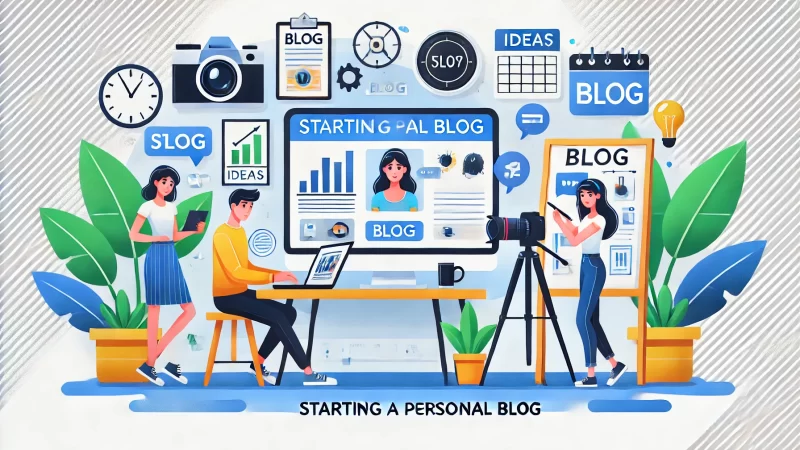
Starting a personal blog opens doors to creativity, connection, and even income. It’s a rewarding venture for anyone who enjoys sharing their thoughts or skills. Let’s explore the reasons that make it so compelling.
Share Your Expertise and Unique Stories
A personal blog allows you to share your knowledge and experiences with the world. Whether you’re an expert in a hobby or have life lessons to share, blogging creates a platform to teach and inspire others.
For example, you might blog about your baking skills, providing readers with tips and recipes. Sharing real-life anecdotes keeps your blog engaging and helps readers connect with your story.
Writing about personal milestones, challenges, or successes humanizes your blog. Readers love relatable content, and your unique journey might inspire someone to embark on their own.
This sharing of expertise and stories isn’t just rewarding for your readers—it can also give you a sense of fulfillment and purpose.
Build a Personal Brand and Online Presence
A personal blog is an excellent way to build your personal brand. It highlights your unique perspective and strengths, making you memorable to readers, potential clients, or collaborators.
For instance, consistently posting about a specific interest, like sustainable living, establishes you as a knowledgeable voice in that space. This credibility can open doors to new opportunities.
Your blog serves as a digital resume, showcasing your skills and passions. Whether you’re aiming for career growth or creative projects, a well-maintained blog can boost your visibility and impact.
Developing an online presence also fosters trust. Readers feel like they know you, which makes your brand more authentic and approachable.
Develop Writing and Communication Skills
Blogging is a powerful way to improve your writing and communication. Crafting posts regularly hones your ability to convey thoughts clearly, helping you grow as a storyteller.
As you write, you naturally refine your style and voice. You’ll learn how to engage readers and keep them interested, which is a valuable skill in any career or field.
Writing about diverse topics sharpens your research and organizational abilities. You might find yourself becoming more articulate in expressing ideas, both online and offline.
These skills extend beyond blogging, positively impacting areas like public speaking, professional communication, and even networking.
Foster Connections and Create a Community
A personal blog connects you with like-minded individuals, fostering a sense of community. By sharing your interests and stories, you attract readers who resonate with your experiences and perspectives.
Readers often comment or reach out to share their thoughts, creating meaningful interactions. These connections can lead to friendships, collaborations, or even support networks that enrich your personal and professional life.
Engaging with your audience builds loyalty. As your blog grows, it becomes a space where people feel comfortable sharing their ideas and learning from yours, creating an enriching, two-way dialogue.
Over time, your blog can become a hub for niche communities. Whether it’s fellow travelers or hobbyists, you’ll find a network of people who value your insights and share their own.
Generate Income Through Monetization Options
Personal blogs offer the potential to generate income. From affiliate marketing to sponsored posts, blogging can turn your passion into a profitable venture while keeping your content personal and authentic.
Affiliate marketing allows you to recommend products you genuinely love, earning a commission for every sale. Writing about things you use and trust makes these recommendations feel organic and valuable to your audience.
Sponsored posts are another great option. Brands may approach you to promote their products, allowing you to earn while staying true to your blog’s values. This is especially viable as your audience grows.
Additionally, ad placements and selling digital products—like eBooks or courses—are lucrative ways to monetize. With consistent effort, a personal blog can evolve into a sustainable income source.
Gain Confidence and Creative Freedom
Blogging is a fantastic way to boost your confidence. Sharing your thoughts with an audience challenges you to step out of your comfort zone, helping you grow personally and creatively.
Over time, seeing positive feedback from readers reinforces your belief in your voice and abilities. It’s incredibly satisfying to know your words resonate and make an impact.
Personal blogs offer unmatched creative freedom. You decide what to share, how to present it, and what tone to use. This flexibility allows you to experiment and evolve without constraints.
For example, you might start with writing but later add photography or videos to your blog. This exploration of creative outlets adds depth to your content and keeps you inspired.
Create a Digital Diary of Your Journey
A personal blog is the perfect way to document your journey, preserving memories and milestones for years to come. It’s like an evolving digital scrapbook that you and others can revisit.
Whether you’re sharing career growth, parenting stories, or travel adventures, blogging helps you capture moments that might otherwise fade. Looking back on old posts can be a heartwarming reminder of how far you’ve come.
It’s also a way to inspire others. Sharing your journey shows readers that they’re not alone in their struggles or triumphs, fostering a sense of connection and encouragement.
The beauty of a personal blog is its timeless value. Years down the line, it serves as a record of your growth, creativity, and impact on others.
Setting Up Your Personal Blog: Easy Steps to Begin
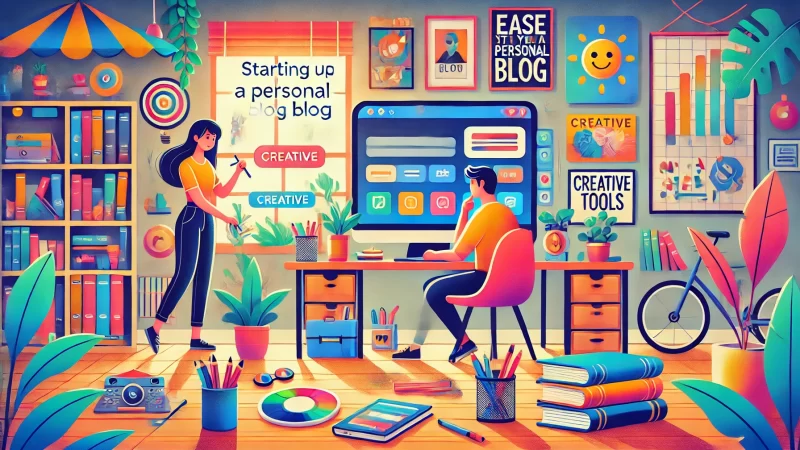
Starting your personal blog is simpler than you think. With a few basic steps, you can launch a blog that’s uniquely yours and ready to captivate readers.
Choosing a Niche That Resonates With You
Your blog’s niche reflects your interests and expertise. It helps define your content and attract the right audience. Think about topics you’re passionate about and comfortable sharing consistently.
Choosing a niche doesn’t mean limiting yourself. For instance, if you’re interested in wellness, you can explore subtopics like mindfulness, fitness, or healthy recipes, keeping your content diverse yet focused.
A well-chosen niche also makes it easier for readers to find your blog. It aligns with specific search queries, improving your visibility on search engines and connecting you with the right audience.
Once you’ve identified a niche, let your personality shine through. Remember, your unique perspective is what makes your blog stand out.
Selecting the Right Blogging Platform
Picking the right platform is essential for your blog’s success. Popular options like WordPress, Wix, and Blogger offer user-friendly tools for creating and managing your blog.
WordPress is a favorite for its flexibility and customization options. Wix offers drag-and-drop features for easy design, while Blogger is great for beginners who want simplicity.
Your choice depends on your goals. If you value creative control, a self-hosted platform like WordPress.org might be ideal. For those who prefer minimal setup, platforms like Medium or Squarespace are excellent.
Whichever platform you choose, ensure it aligns with your technical skills and long-term blogging aspirations.
Designing Your Blog for Maximum Impact
The design of your blog creates the first impression, so make it visually appealing. Choose a clean layout, legible fonts, and an inviting color scheme that reflects your personality or niche.
Adding intuitive navigation is crucial for user experience. Organize categories, create a clear menu, and make it easy for readers to explore your content.
Images and visuals enhance your blog’s aesthetics. High-quality photos, relevant graphics, and creative banners keep readers engaged and make your posts memorable.
A well-designed blog not only looks professional but also encourages visitors to stay longer and return for more.
Writing Your First Engaging Blog Post
Your first blog post sets the tone for your journey. Share something meaningful, like why you started blogging or what readers can expect from your content.
Begin with an attention-grabbing introduction to hook your audience. Use a conversational tone, sprinkle in your personality, and keep the content relatable.
Don’t stress about perfection. Focus on authenticity and clarity. Your readers will appreciate your honest voice more than polished, impersonal writing.
Include a call-to-action at the end, inviting readers to comment, share, or follow your blog. Engagement starts with an open invitation to connect.
Promoting Your Blog to Reach a Wider Audience
Promoting your blog ensures it reaches the right audience and gains visibility. Effective promotion combines social media, networking, and content sharing strategies to expand your readership and build an engaged community around your blog.
Start by sharing your blog posts on social media platforms like Facebook, Instagram, Twitter, or LinkedIn. Tailor your posts to each platform, using eye-catching images, hashtags, and engaging captions to draw attention to your content.
Collaborate with other bloggers in your niche by guest posting or cross-promoting. This helps you tap into their audience while providing valuable content to their readers. It’s a win-win for both parties.
Leverage email marketing to keep readers updated on new posts. Build a subscriber list and send out regular newsletters highlighting your latest content and exclusive updates. This fosters loyalty and consistent engagement.
Lastly, engage with your audience by replying to comments, participating in discussions, and joining online communities related to your niche. Building genuine connections creates a network of readers who support and share your blog.
Best Practices for Maintaining a Successful Blog
To maintain a successful blog, focus on quality, engagement, and adaptability. Consistent updates, reader interaction, and strategic content diversification ensure your blog remains relevant, engaging, and valuable to your audience over time.
Consistently Updating With Quality Content
Consistency is key to keeping readers engaged. Posting regularly establishes trust and ensures your audience knows when to expect new content. Quality, however, should always take precedence over quantity to maintain your blog’s value.
Create an editorial calendar to stay organized. Planning ahead allows you to brainstorm ideas and ensure posts align with your blog’s theme. It’s a practical way to maintain regular updates without feeling overwhelmed.
Each post should resonate with your audience. Focus on their interests, answer questions, or solve problems they might have. This approach keeps readers coming back for more and helps build a loyal community.
Consistency also helps with search engine rankings. Regular updates signal to search engines that your blog is active, improving its visibility and helping it reach more readers organically.
Engaging With Readers Through Comments and Feedback
Engagement is the heart of personal blogging. Interacting with your readers through comments and feedback builds a stronger connection and encourages loyalty. Make it a habit to respond to comments promptly and thoughtfully.
When readers leave comments, view it as an opportunity to start a conversation. A simple “Thank you” or a detailed response to a question can make readers feel valued and appreciated, fostering a sense of community.
Encourage feedback by asking open-ended questions in your posts. This invites readers to share their opinions and experiences, enriching the discussion and making your blog more interactive.
Positive engagement also enhances your blog’s credibility. Readers are more likely to trust and recommend a blog that values their input and takes the time to respond meaningfully.
Leveraging SEO for Greater Visibility
Search Engine Optimization (SEO) is essential for growing your blog’s audience. It involves optimizing your content to rank higher in search engine results, making it easier for readers to discover your posts.
Incorporate keywords naturally into your posts, titles, and meta descriptions. For instance, using “what is a personal blog” strategically ensures your content aligns with relevant searches without sounding forced.
Structure your posts with headings, bullet points, and concise paragraphs. This improves readability and aligns with SEO best practices. Search engines favor well-organized content that keeps readers engaged.
Don’t forget backlinks and internal linking. Linking to authoritative sources boosts credibility, while internal links guide readers to other relevant posts, keeping them on your blog longer.
Diversifying Content With Images and Videos
Diversifying your blog content with visuals keeps it engaging. Photos, infographics, and videos break up text, making posts more appealing and easier to digest for readers.
High-quality images add value to your content. For example, a travel blog post with vibrant pictures of destinations creates a stronger connection with readers and enhances their experience.
Videos can be particularly impactful. A short tutorial or vlog adds a personal touch, helping readers connect with you on a deeper level. It’s an excellent way to share your personality.
Infographics are perfect for summarizing information. They’re visually appealing and easy to share, increasing the likelihood that your content will be shared across social media.
Tracking Analytics to Measure Blog Performance
Tracking analytics helps you understand your blog’s performance. Tools like MonsterInsight and Google Analystics provide insights into traffic, audience behavior, and popular content, allowing you to refine your strategy for growth.
Reviewing metrics like page views and bounce rates highlights what’s working and what isn’t. If a particular post gets high engagement, consider creating more content around that topic to satisfy your audience’s interests.
Track reader demographics to tailor content to their preferences. Knowing your audience ensures your blog aligns with their needs, increasing engagement and retention.
Analytics also help measure the effectiveness of promotional strategies. For example, tracking referrals can show whether social media or email campaigns are driving the most traffic.
Overcoming Challenges in Personal Blogging

Blogging comes with its challenges, from time management to dealing with criticism. Addressing these obstacles effectively ensures you stay consistent, motivated, and confident in your blogging journey.
Managing Time and Staying Consistent
Finding time to blog can be challenging, especially with other responsibilities. Creating a realistic schedule and setting clear goals helps you stay on track without feeling overwhelmed.
Batch content creation is a useful strategy. Set aside specific days to write multiple posts, edit images, or schedule updates. This approach streamlines your process and keeps content flowing regularly.
Break tasks into smaller steps. Instead of tackling an entire post in one sitting, draft an outline one day and write the content the next. Smaller milestones make blogging more manageable.
Remember, it’s okay to adjust your schedule. Consistency doesn’t mean posting every day—it means maintaining a rhythm your readers can rely on.
Avoiding Writer’s Block and Staying Inspired
Writer’s block is a common challenge, but it’s not insurmountable. When inspiration wanes, take a break to clear your mind. Sometimes, stepping away is the best way to reignite creativity.
Keep a list of ideas handy. Whenever inspiration strikes, jot it down in a notebook or app. Having a pool of ideas to draw from ensures you never run out of topics to write about.
Explore other blogs or content for inspiration. Reading others’ work can spark ideas or new approaches for your own posts. Just ensure your content remains original and authentic.
Experimenting with different formats, like listicles or interviews, can also refresh your creativity. Variety keeps you inspired and your readers engaged.
Dealing With Criticism Constructively
Criticism is inevitable, but how you handle it matters. Use it as an opportunity to grow. Consider constructive feedback thoughtfully and apply it to improve your blog where appropriate.
Not all criticism is helpful. Learn to filter out negative comments that lack substance. Focus on feedback that aligns with your goals and values, and don’t let unhelpful remarks discourage you.
When responding to criticism, remain professional and kind. A respectful reply shows readers you value their opinions, even if you disagree.
Confidence in your vision is crucial. Stay true to your blog’s purpose, and don’t let criticism derail your passion for sharing your story.
Balancing Personal Sharing and Privacy
Blogging about personal experiences requires a balance between openness and privacy. Share stories that resonate with your audience but set boundaries to protect your comfort and safety.
Decide in advance what you’re comfortable sharing. For instance, you might choose to write about parenting but avoid disclosing your children’s names or locations. Clear boundaries help maintain privacy.
Be mindful of sensitive topics. If sharing involves other people, consider their perspectives and seek permission when necessary. Respect for privacy builds trust with your audience.
Remember, you control your narrative. Share what feels authentic and beneficial to your readers, but never feel obligated to disclose more than you’re comfortable with.
Future Trends in Personal Blogging to Watch
Personal blogging is continually evolving, offering exciting opportunities for creativity and growth. Staying updated on emerging trends ensures your blog remains relevant, engaging, and well-positioned to connect with readers in new and meaningful ways.
Growth of Multimedia Content Integration
Multimedia is becoming a cornerstone of blogging, transforming how readers engage with content. Incorporating videos, podcasts, and interactive visuals enriches the user experience and provides dynamic ways to convey your message.
For instance, adding videos to your blog allows you to explain complex ideas visually. Tutorials, behind-the-scenes clips, or storytelling videos offer an immersive way to connect with your audience, making your content more memorable.
Podcasts are another great addition. Hosting audio episodes on specific topics helps you reach a broader audience, especially those who prefer listening over reading. It’s also an excellent way to showcase your personality and expertise.
Interactive visuals, such as infographics or polls, invite readers to participate actively in your content. This not only boosts engagement but also increases the likelihood of readers sharing your posts with others.
Expanding Opportunities in Niche Blogging
Niche blogging continues to gain momentum, offering bloggers a focused approach to building their audience. Specializing in a particular topic allows you to establish authority and attract readers who are passionate about that area.
Choosing a niche you’re genuinely interested in makes the process enjoyable and sustainable. Whether it’s vegan cooking, eco-friendly living, or vintage fashion, your enthusiasm will shine through and resonate with your audience.
Niche blogging also helps you stand out in a crowded space. Readers often seek specialized content tailored to their needs, and a well-defined niche ensures your blog meets those expectations effectively.
Monetization opportunities are abundant in niche blogging. Brands are eager to collaborate with bloggers who cater to specific audiences, opening doors for sponsored content, affiliate partnerships, and exclusive product promotions.
How AI Tools Are Enhancing Blogging Experiences
AI tools are revolutionizing personal blogging, making content creation more efficient and insightful. From idea generation to editing, these tools simplify tasks, giving you more time to focus on crafting meaningful content.
For example, AI-driven tools like Grammarly and Hemingway App polish your writing, ensuring clarity and readability. They provide real-time feedback on grammar, tone, and structure, helping you refine your posts.
AI-powered platforms like Jasper or ChatGPT assist with brainstorming blog topics, drafting outlines, or even writing initial drafts. This speeds up your workflow without compromising quality or authenticity.
Analytics tools powered by AI offer deeper insights into your audience’s behavior. Understanding which posts perform best helps you tailor future content, boosting engagement and satisfaction among your readers.
The Role of Social Media in Driving Blog Traffic
Social media is a powerful tool for promoting personal blogs and reaching a wider audience. Platforms like Instagram, Pinterest, and Twitter act as amplifiers, helping your content gain visibility and engagement.
Strategic sharing is key. I suggest posting snippets or highlights of your blog posts on social media with captivating visuals and strong calls to action. This entices followers to click through to your blog.
Engage with your audience on these platforms to foster a sense of connection. Responding to comments, participating in discussions, and joining relevant groups or hashtags ensures your blog stays visible and relatable.
Social media also encourages content sharing. Readers who find value in your posts are likely to share them with their networks, further expanding your reach and building your blog’s reputation organically.
Frequently Asked Questions (FAQ)
What is a personal blog?
A personal blog is an online platform for sharing personal stories, experiences, and insights, reflecting the blogger’s individuality.
Why should I start a personal blog?
Personal blogging fosters creativity, connects with like-minded individuals, and can even generate income through monetization options.
What topics can I write about in a personal blog?
Common topics include travel, lifestyle, personal growth, hobbies, parenting, and more—whatever resonates with your passions.
How do personal blogs differ from business blogs?
Personal blogs focus on individuality and creative freedom, while business blogs target marketing and professional goals.
How can I monetize my personal blog?
Use affiliate marketing, sponsored posts, ad placements, or sell digital products like eBooks or courses.
What platform is best for starting a personal blog?
WordPress, Wix, and Blogger are popular choices, depending on your goals and technical skills.
What are the benefits of personal blogging?
It boosts confidence, builds an online presence, enhances writing skills, and fosters community connections.
How often should I update my blog?
Consistency is key; posting regularly, even once a week, helps build trust and keep readers engaged.
What challenges might I face when blogging?
Common challenges include time management, writer’s block, and balancing personal sharing with privacy.
How can I improve my blog’s visibility?
Use SEO techniques, promote on social media, and engage with your audience to increase reach and engagement.
What is the importance of creative freedom in blogging?
Creative freedom allows bloggers to experiment with styles, formats, and topics, keeping content authentic and engaging.
Can a personal blog evolve into a professional one?
Yes, many personal blogs grow into professional brands through consistent content and audience engagement.
What tools can help me manage my blog?
Tools like Grammarly, Canva, and Google Analytics can assist with writing, visuals, and performance tracking.
How can I engage with readers on my blog?
Respond to comments, invite feedback, and encourage discussions to foster a community feel.
What makes a personal blog successful?
A unique voice, engaging content, consistency, and genuine connections with readers are key to success.


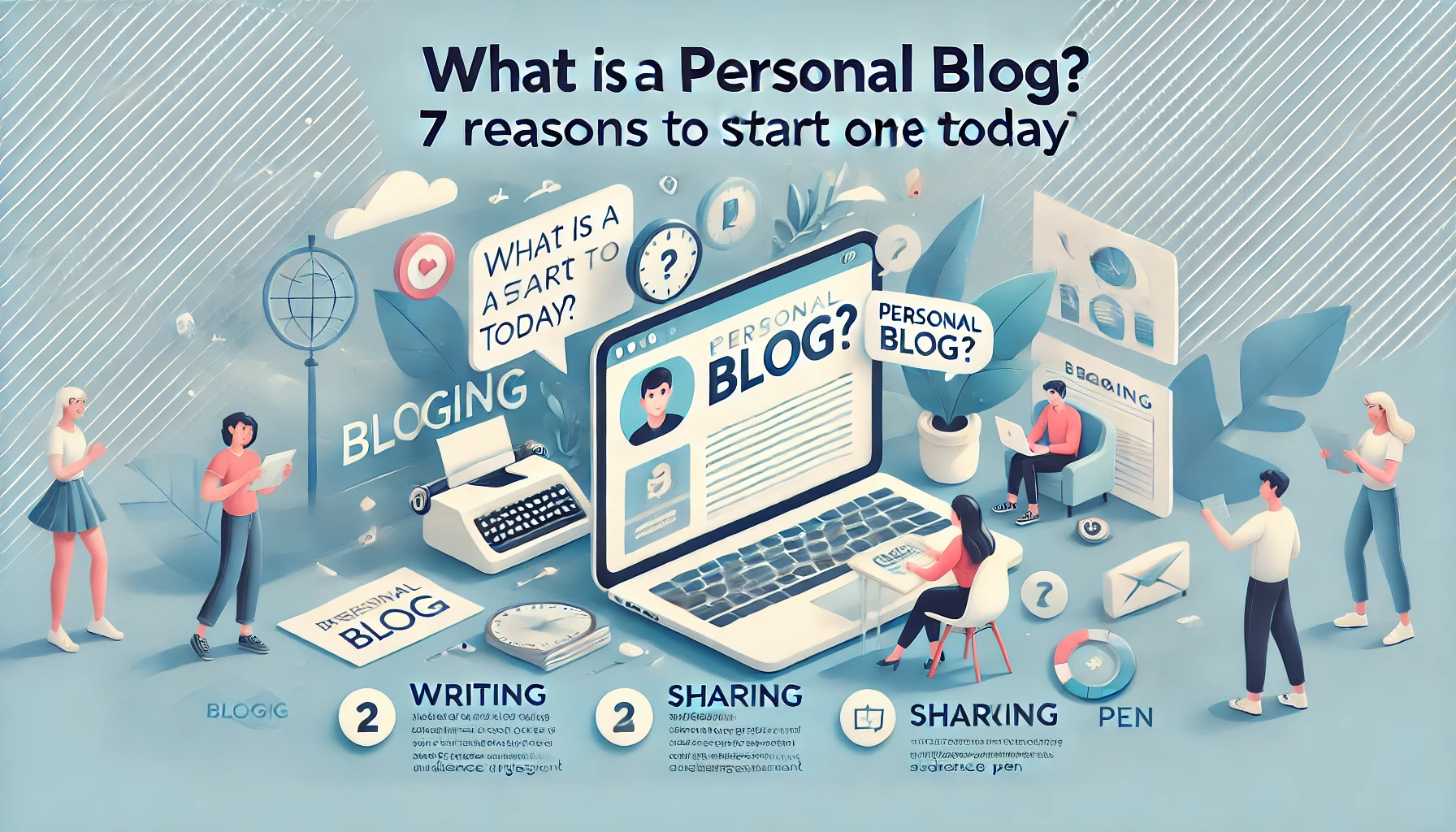
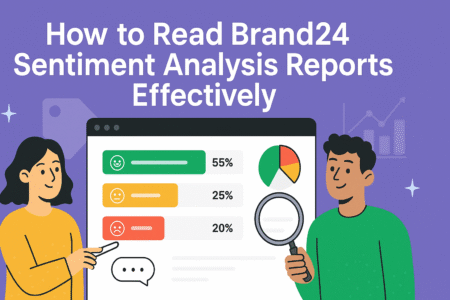
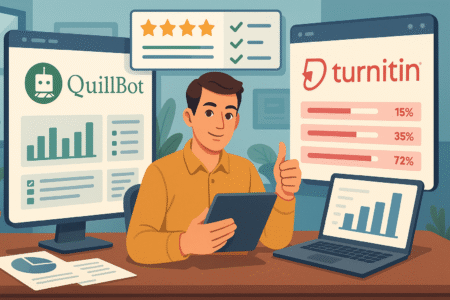
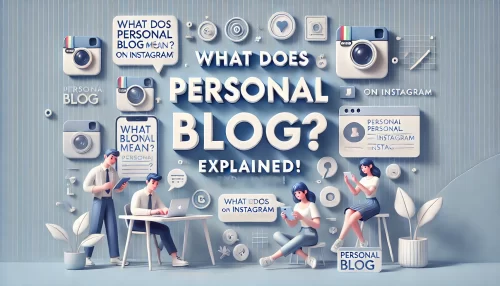
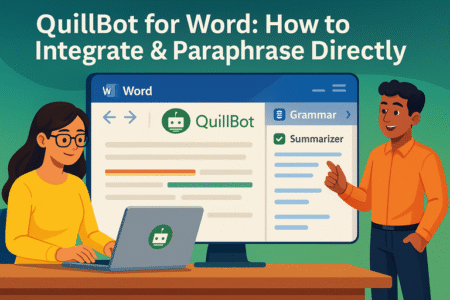
That is really attention-grabbing, You’re a very
skilled blogger. I’ve joined your rss feed and look forward to in quest of extra of your fantastic post.
Additionally, I’ve shared your web site in my social networks
Thank you so much for your kind words and support! I’m thrilled to hear that you find my content engaging and valuable. It means a lot that you’ve joined the RSS feed and are looking forward to more posts—it keeps me motivated to continue sharing helpful insights.
Thanks again for your encouragement! 😊
Its not my first time to pay a quick visit this website, i am browsing this web site dailly and take fastidious information from here all the time.
Thank you so much for your kind words and for being a regular visitor! I’m thrilled to hear you find value here. Your support means a lot, and I hope you continue to enjoy the content. If there’s anything specific you’d like to see, feel free to share!